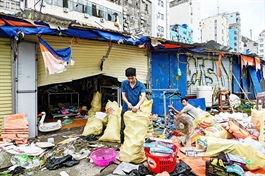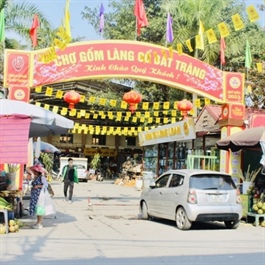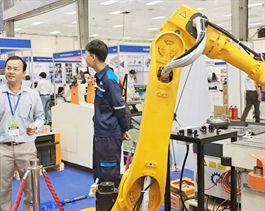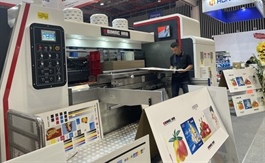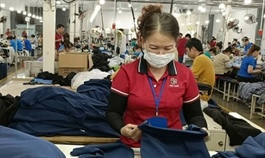Việt Nam's carbon market: regulatory challenges ahead
Việt Nam's carbon market: regulatory challenges ahead
The development of a carbon credit market in Việt Nam faces significant challenges, primarily due to unclear regulations. While businesses recognise the need to reduce greenhouse gas emissions and are eager to participate in the market, they are hindered by management and monitoring systems that require further improvement.
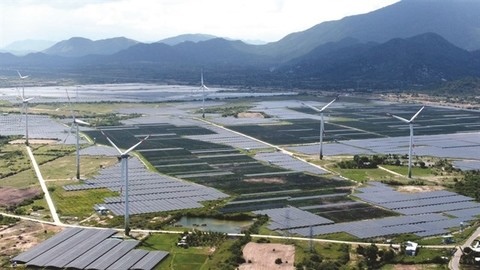
Harvesting high quality rice in the fields of Tiến Thuận Cooperative in the Mekong Delta province of Cần Thơ. Việt Nam is accelerating a project to develop one million hectares of high-quality and low-carbon rice in the delta. VNA/VNS Photo Thu Hiền |
Carbon credits have emerged globally as a key tool in the fight against climate change, encouraging projects aimed at reducing greenhouse gas emissions.
Hoàng Văn Tâm, from the Department of Energy Saving and Sustainable Development under the Ministry of Industry and Trade, emphasised the urgency of creating a robust carbon market.
“Establishing and advancing the carbon market is crucial for enhancing national efforts to reduce greenhouse gas emissions. It also offers an opportunity to leverage social capital in mitigation activities. Each tonne of CO2 that meets market standards qualifies as a carbon credit, tradable within the market,” he said.
The draft project for developing Việt Nam's carbon market from 2025 to 2028 outlines a pilot programme set to run nationwide. By 2029, the market is expected to officially launch, with preparations underway to connect it to regional and global platforms.
In recent years, the world has faced multiple crises, including energy, environmental, and economic challenges. The global energy crisis, exacerbated by geopolitical tensions, has driven up energy prices, impacting economies worldwide. Meanwhile, environmental crises—marked by extreme weather events, deforestation, and air pollution—pose significant threats to achieving sustainable development goals.

A wind and solar power plant complex in Thuận Nam District, Ninh Thuận Province. Carbon credits serve as an essential tool for promoting sustainable energy solutions. VNA/VNS Photo Huy Hùng |
In this context, carbon credits play a critical role in promoting sustainable energy solutions, reducing dependence on traditional energy sources like coal, oil and gas. The value of carbon credits has soared as countries and businesses increasingly recognise the importance of cutting greenhouse gas emissions to combat climate change.
The average value of carbon credits in the global market has risen significantly, reflecting growing demand from businesses and nations eager to trade carbon credits, according to the Carbon Pricing Leadership Coalition (CPLC).
Regarding Việt Nam’s prospects in carbon market development, Nguyễn Phương Nam, general director of KLINOVA Climate Innovation Consulting and Services, highlighted two major advantages based on international assessments and the country’s geographic location.
Firstly, Việt Nam’s tropical climate provides ample potential for renewable energy and biomass, enhancing its capacity for carbon absorption. Secondly, the nation’s socioeconomic development activities create further opportunities for growth in this sector.
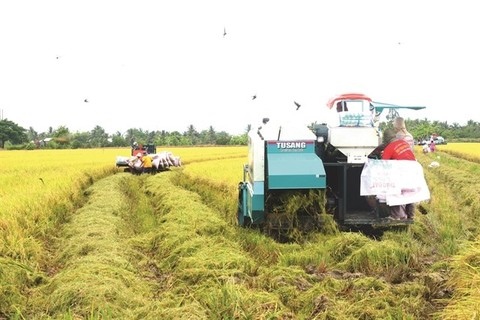
A forest is planted and strictly protected in Châu Đức District, Bà Rịa Vũng Tàu Province. Việt Nam has successfully created and sold over 40 million carbon credits derived from its forests. VNA/VNS Photo Hoàng Nhị |
Professor Hoàng Văn Sâm at the University of Forestry said that Việt Nam had registered and sold over 40 million carbon credits from its forests through various international mechanisms, particularly within the voluntary market.
“The country actively participates in initiatives like the Climate Change Action Mechanism (CAM) and the Gold Standard (GS), as well as forestry programmes focused on afforestation and reforestation. With its abundant forest resources, especially mangrove forests, and strong agricultural production capabilities, Việt Nam is well-positioned to expand its carbon market,” he said.
In the forestry sector, Trần Hiếu Minh, head of the Department of Science, Technology and International Cooperation under the Ministry of Agriculture and Rural Development, said that efforts to protect, develop, and restore forests had significantly increased both the area and quality of forest coverage, now at 42.02 per cent.
The Reducing Emissions from Deforestation and Forest Degradation (REDD+) project helped the forestry sector achieve nearly 57 million tonnes of CO2 emissions reductions from 2014 to 2018.
In 2023, Việt Nam sold 10.3 million forest carbon credits (equivalent to 10.3 million tonnes of CO2) for US$51.5 million through the World Bank. This revenue is critical for reinvesting in forest protection and development, job creation, and contributing to net-zero targets.
Việt Nam is also advancing a project to develop one million hectares of low-carbon, high-quality rice in the Mekong Delta, potentially allowing farmers to earn income by selling carbon credits if emissions are reduced.
Addressing legal hurdles
Tạ Đình Thi, deputy chairman of the National Assembly's Committee on Science, Technology and Environment, acknowledged Việt Nam’s early strides in carbon market development.
In 2013 the Communist Party of Việt Nam Central Committee issued Resolution 24 focusing on climate change, resource management, and environmental protection. Additionally, the Politburo’s Resolution 55 issued in 2020 outlines Việt Nam's energy development strategy towards 2030, including research into carbon tax policies for fossil fuels.
The Law on Environmental Protection, passed in 2014 and revised in 2020, further supports carbon market development.
However, Thi said that the policy framework still lacked critical regulations on the ownership and transfer of carbon credits, commercial exchanges, and the management of related revenues.
Trần Hồng Nguyên, vice chairwoman of the Law Committee of the National Assembly, said that the carbon market was complex and emerging, making current policies incomplete.
“We need to establish an ecosystem and legal framework that allows businesses to operate effectively. This is the responsibility of state management agencies,” she said, expressing hope that the Government and relevant ministries would expedite the completion of the Carbon Market Development Project.
A crucial first step
A greenhouse gas inventory is a vital first step for businesses, organisations, and countries entering the carbon credit market. However, many businesses face challenges in fulfilling the Government's requirement for greenhouse gas inventories, according to Bùi Thanh Minh, deputy director of the Office of the Private Economic Development Research Board (Division IV).
"Many businesses lack information or are hesitant to act. For a market to exist, there must be goods, and those goods need clear ownership," he said. "Businesses hesitate to participate due to uncertainty over who owns the carbon credits."
KLINOVA General Director Nam added that businesses seeking to invest in carbon credits encounter obstacles in securing funding and accessing clear information due to ambiguous documentation.
Countries like Việt Nam, Thailand and Singapore are proactively developing legal frameworks to incorporate carbon credits into their national carbon pricing policies, aiming to integrate into the global market quickly.
The implementation of a carbon market in Việt Nam holds great potential for businesses to reduce greenhouse gas emissions and engage in the green economy, but it requires careful preparation and strong collaboration among stakeholders.










